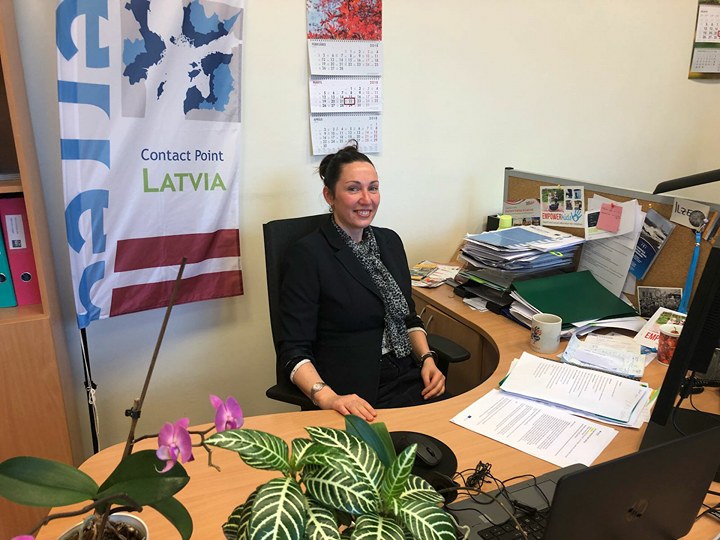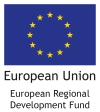In this mini-series, we introduce our national Contact Points from around the programme area. The national Contact Points are the link between the programme and the regions. They inform about the funding opportunities and provide first information to potential applicants. Contact Points also help with partner search and matchmaking. In addition, they follow projects closely to share/spread project results and communicate the benefits of cross-border cooperation.
Part 1: Our national Contact Point on Åland - Esterr Laurell
Part 2: Our national Contact Point in Finland - Jaakko Ranta
Ilze Lezgdina
(2018)
My name is Ilze Legzdina, and for the last six months I have been the Latvian National Contact Point for the Central Baltic Programme. I am located in Riga with my host organisation – the Ministry of Environmental Protection and Regional Development.
How did you end up working with Central Baltic?
In spring 2017, after travelling around the world for fourteen months, I returned to my home country Latvia and started looking for a job. Before that, I worked at an EU institution in Helsinki, Finland, where I lived for over four years. Initially, I felt tempted to go back to Finland, as my last memories of 'home' and the safety and stability it embodies were from there.
Then a friend drew my attention to a vacancy notice for the position of Latvian National Contact Point for the Central Baltic Programme. When I learned that it was somehow related to Finland and entailed being part of an international team as well as dealing with cross-border projects, I was ready to apply. And here I am.
What does a typical working day look like?
I check information about the project news and activities on social media and contact the partners, asking how projects are doing, what is the latest news, etc. Sometimes I participate in project-related events, and I promote their news and activities on social media. Occasionally I interview project partners.
Although it takes a lot of effort, I like organising thematic seminars because they bring together those implementing a project with the potential target group and provide an opportunity to 'spread the word' to a wider audience. I think it is about time to plan another in the near future!
What are you currently working on?
I am working on the 'Team Information Manual' - a document for internal use by our team, and especially useful for newcomers. I am familiarising myself with projects that have recently started up, or are about to, and introducing myself to the Latvian partners. I am also trying to identify new options to tell people about the projects, and how interesting and useful their results are.
What is the best thing about your work?
Although my previous professional experience was related to the EU, the area of European Territorial Cooperation was absolutely new to me. A lot to learn, a lot of documents to read. Then I participated in some project events, which opened a totally new perspective for me.
This is what I like best: it is a pleasure meeting people whose eyes shine when talking about their idea, then to play a role in making it come true step by step. Even better is meeting people who are affected one way or another by the project results. Sometimes it seems the impact has a ripple effect that goes much further than expected. This fire makes me want to share it.
Part 1: Our national Contact Point on Åland - Esterr Laurell
Part 2: Our national Contact Point in Finland - Jaakko Ranta
Ilze Lezgdina

(2018)
My name is Ilze Legzdina, and for the last six months I have been the Latvian National Contact Point for the Central Baltic Programme. I am located in Riga with my host organisation – the Ministry of Environmental Protection and Regional Development.
How did you end up working with Central Baltic?
In spring 2017, after travelling around the world for fourteen months, I returned to my home country Latvia and started looking for a job. Before that, I worked at an EU institution in Helsinki, Finland, where I lived for over four years. Initially, I felt tempted to go back to Finland, as my last memories of 'home' and the safety and stability it embodies were from there.
Then a friend drew my attention to a vacancy notice for the position of Latvian National Contact Point for the Central Baltic Programme. When I learned that it was somehow related to Finland and entailed being part of an international team as well as dealing with cross-border projects, I was ready to apply. And here I am.
What does a typical working day look like?
I check information about the project news and activities on social media and contact the partners, asking how projects are doing, what is the latest news, etc. Sometimes I participate in project-related events, and I promote their news and activities on social media. Occasionally I interview project partners.
Although it takes a lot of effort, I like organising thematic seminars because they bring together those implementing a project with the potential target group and provide an opportunity to 'spread the word' to a wider audience. I think it is about time to plan another in the near future!
What are you currently working on?
I am working on the 'Team Information Manual' - a document for internal use by our team, and especially useful for newcomers. I am familiarising myself with projects that have recently started up, or are about to, and introducing myself to the Latvian partners. I am also trying to identify new options to tell people about the projects, and how interesting and useful their results are.
What is the best thing about your work?
Although my previous professional experience was related to the EU, the area of European Territorial Cooperation was absolutely new to me. A lot to learn, a lot of documents to read. Then I participated in some project events, which opened a totally new perspective for me.
This is what I like best: it is a pleasure meeting people whose eyes shine when talking about their idea, then to play a role in making it come true step by step. Even better is meeting people who are affected one way or another by the project results. Sometimes it seems the impact has a ripple effect that goes much further than expected. This fire makes me want to share it.


